Yosuke Mitsusada
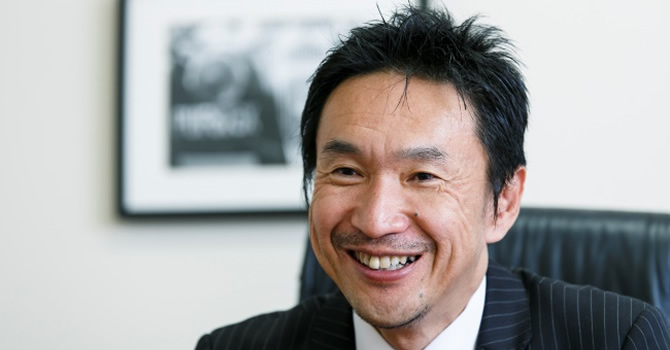
- Classification
- Equity
- Company
- Asuka Asset Management(currently Aizawa Asset Management Co., Ltd)
Yosuke Mitsusada, PH.D, CFA Chief Fund Manager of Asuka Asset Management Director and Founding partner of Asuka Corporate Advisory He has 23 years of investment experience. He joined Asuka Group in 2005. Prior to joining Asuka Group, he was a director at Unison Capital (Private Equity Firm) where he has led a number of M&A transactions and corporate management/enhancement projects (2000-2005). He served as an external Audit &Supervisory; Board Member at Tohato and Drug11, etc. He also has investment experience as a fund manager at Nippon Credit Bank and Gartmore Group where he developed Japan’s first long/short strategy publicly offered mutual fund. He is one of the few fund managers in Japan with a broad range of experience in both the public and private equity markets. He also serves as a committee member of Security Analyst Journal. He is the author of a number of books and academic papers, including “Ownership Structure and Equity Returns in Japan ? Effectiveness of Market-Oriented Governance” (2008 winner of the SAAJ (Securities Analyst Association of Japan) Journal Award). He received his MBA from the Waseda School of Finance, Accounting and Law, graduating at the top of his class. Subsequently he obtained his CFA accreditation, and earned his Ph.D. from the Tokyo Institute of Technology.
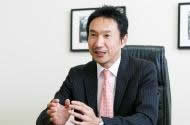
“Design and creating a new Japan through our investments” is the investment philosophy of our Asuka Value Up Strategy. We invest in small-to-mid cap listed companies in Japan. Our investments are carefully selected, taking a long-term and amicable approach that aims to increase investees’ corporate value.
Some Japanese companies have strong operations and provide competitive products and services, but they are not fully appreciated in the stock market. Others have potential to grow their sales or profits, but only if they learn some innovative management techniques. In our screening process, we carefully examine: ?company management, ?competitiveness of the business and ?scope of the value up (engagement). As for ?the company management criteria, we examine whether they have “Growth Mind” for profit through improvements or changes, “Open” stance for the outsiders’ opinions, and “Discipline” as a public company. We refer to these criteria as “GOD”, an acronym of “Growth mind”, “Openness”, and “Discipline”, and we discuss and study whether the company management is “GOD” or not from all angles. Next, we evaluate ?the competitiveness of the business. From a quantitative view point, we set high value on ROIC (Return on invested capital) and ROE (Return on equity). From a qualitative view point, we evaluate their market power/market share, the brand, research and development, operational excellence, and effort to further improve these advantages and excellence. The combination of quantitative and qualitative analysis helps us identify the companies with primordial competitiveness in their business. As for the ?scope of the value up (engagement), we discuss thoroughly if we can formulate a hypothesis to increase the business value or fill the gap of value and stock price.
To assess these three points above, we conduct “In-depth research” in advance. In this research, we make the best use of team members’ networks and skills. Some examples of this research include telephone interviews with contacts at investee companies, in-person interviews or visits to their facilities as well as peripheral investigations on competitors, industry interest groups, research institutions, related government agencies, client companies, sell-side analysts, members of the media, etc.
After investment, we establish trust with our investee companies through in-depth discussions with their managements. Then we propose value up strategies for investee companies to accelerate their mid- to long-term sustainable growth, which in turn will improve their corporate values and fair valuations in the capital market.
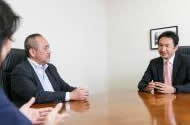
The current Japanese market environment provides great opportunities for long-term management support funds such as Asuka Value Up Strategy. First, one of the characteristics of Japanese small-to-mid cap company management is that they are not very good at utilizing their potential capabilities although they already have global competitiveness. The major obstacles are limited management resources compared to large cap company, such as people, management strategy, capitals and so on. We support removing these obstacles and help them in developing their advantages. For example, the discussions with a company management may bring a new growth area to light. If they don’t have enough people, we introduce people or potential alliance partners.
Secondly, the short-termism and speculative investors are more dominant in Japanese capital market than in other global markets. As a result, if a company announces some bad news for the short-term view, the stock price tends to drop below its fair value. As one of the few long-term investors in Japanese market, we enjoy great investment opportunities with such stock market movement.
In addition, in February 2014, the government introduced the Japanese Stewardship Code. This code urges Japanese institutional investors to have constructive “purposeful dialogues” with investee company based on in-depth understanding of their business environment and the company itself. As the Japanese stock market is about to change significantly, we believe that there will be a great potential to make mid- to long term return leveraging these engagement activities, which will bring enhanced corporate value and sustainable growth to the investee companies. Asuka Value Up Strategy has a long track record of similar engagement activities since 2005.
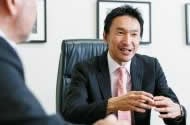
first started my equity investments when I was in high school. At the beginning of my career as a professional fund manager, which I started in 1990, I was quite interested in the price movements and valuations, but I came to be more interested in the management of the investee companies afterwards. In order to deepen my knowledge of the management, I moved to the private equity industry (PE) as a fund manager. In the PE industry, I made several proposals to the investee companies to enhance corporate values and supported them as they carried out these plans. What I learned there were: ?Even if the proposal is excellent or you have the majority of the stake, the company management may not move. The way of the communication with in-depth understanding the company and CEO’s situation is more important to produce change. ?A competitive company has great potential to enhance its value by reinforcing its advantages. I started this fund with the belief that I should make the most use of my management improvement skills and human skills for listed companies to help many small- to mid cap companies to heighten their corporate values.
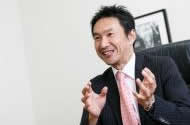
One of my beliefs is “the market has something exceeding human intellect”. Therefore I always try to admit my mistakes.
Also, I believe “there is no perfect human being nor perfect company research”. So in the discussions with my team members, I treat different points of view equally, argue from different angles, and sometimes dare to put myself an opposite side. I try to make the final decisions independently after hearing everyone’s insight.
In another aspect, as one of characteristics of this strategy, the impact of one investee company’s performance is quite big for the entire strategy. I try to make the best use of my working experience at a bank and in the PE business, such as setting high value on the evaluation of the CEO’s characteristics. To assess the real governance or culture of the company, I also ask employees about the internal reputation of the CEO and each board member. “The situation always changes along with time” is my another belief. “The flow of the river is ceaseless and its water is never the same” is a good example. This is applicable to changing company/management/business environment. Therefore I always ask myself such questions as “what were the bases of the investment?”, ” have they changed?”, “If my positions were all in cash, would I invest in that company?”
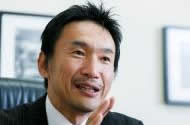
This strategy is operated by Asuka Asset Management Co.,Ltd. (hereinafter “AAM”) with an investment advisement by Asuka Corporate Advisory Co.,Ltd. (hereinafter “ACA”). One of the characteristics of the members engaged in this strategy is that they have diverse backgrounds. The backgrounds can be divided broadly into three areas: ? private equity (PE) and venture capital (VC) investment, ? management consulting, and ? hedge fund experience. All the members gather at least once a week and exchange opinions and thoroughly discuss the investee companies and potential investee companies from various angles. We share a common culture to respect for each other, each member can assimilate other members’ experience and knowledge, and we have high level of organizational research, analysis, proposal and, communication capability. This is how we established an operational system which doesn’t rely simply on personal skills. The PE/VC experience can help to discover long term corporate value, the management consulting experience can help the value up proposal activities to improve corporate value itself and the hedge fund experience can help to grasp oversold/overbought situation and to control the overall position properly.
Between AAM and ACA, 6 members are engaged in this strategy and cover 15-20 companies, continuously developing and maintaining deep relationships with investee companies.
Notes:
This article originally appeared on Sep 29, 2014. Any views presented in this article are as of such date and are subject to change.
This article and the information provided therein are not a recommendation to purchase or sell any security, nor are they intended to constitute the marketing of, or a solicitation for investment in, any investment product.
Asuka Asset Management Co., Ltd. was established in 2002 as an independent investment advisory company based in Tokyo, Japan. The founding partners of Asuka Asset Management, Mamoru Taniya, Toshihiro Hirao (ex-Co-Heads of Asian Proprietary Trading at Salmon Smith Barney), and Kazuho Toyoda (ex-Head of Research and Risk Management at Salmon Smith Barney), established the firm via MBO of Tudor Capital Japan Limited, the Japanese subsidiary of US based major hedge fund. In July 2014, Asuka Asset Management entered into a strategic partnership and cross ownership with StormHarbour, an investment bank operating business globally, in order to further strengthen our operational foundation.
Asuka Asset Management specializes in alternative investments and provides various products and services to investors seeking investment opportunities in Japan and Asia.
Asuka Value Up Strategy
The Value Up Strategy is a hands-on, concentrated fund which focuses on value creation within a small selection of Japanese equities. Working in partnership with company management teams, our value up strategies aim to increase corporate value and generate long-term, stable absolute returns.
Asuka Opportunities Strategy
The Opportunities Strategy is a multi-strategy / multi-trader fund which focuses on the Japanese market and will invest in equity, fixed income, currency, and other assets. The strategy continually seeks investment opportunities by maximizing each fund manager's individual strengths and stable absolute returns while limiting downside through diversification and strict risk management.
Asuka Japanese Equity Long Short Strategy
The Japanese Equity Long Short strategy employs a multi-manager platform. The strategy consists of a variety of investment styles by combining long and short equity positions in the portfolio. Using strict downside risk management, the strategy aims to achieve stable absolute returns by efficiently allocating capital among the different investment styles.
Asuka Insurance Linked Opportunities Strategy
The Insurance Linked Opportunities Strategy invests in a wide range of ILS products, focused on natural catastrophes. The ILS market has substantiated its low correlation to other financial markets.

October 3, 2014
by Investment in Japan

